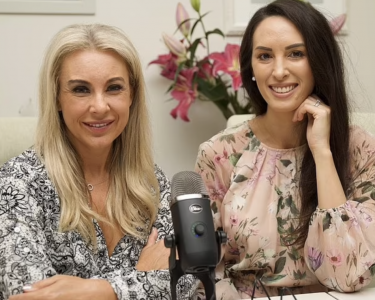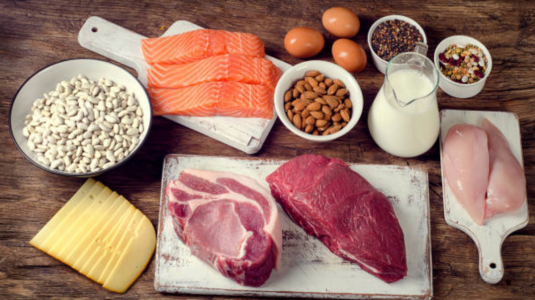The two major nutrient deficiencies affecting Aussie women, according to dietitians
- Replies 12
Women naturally have a lot on their plates. There are a million things competing for their attention at once, such as work, family, friends, and many others – it's no wonder they sometimes let their own health and well-being fall by the wayside. There’s simply not enough time in the day.
But even though they might not always have time to prepare the most nutritionally-balanced meals or hit the gym as often as they'd like, that doesn't mean they should completely neglect their diets.
After all, poor diet choices can lead to all sorts of health problems down the line.
For example, did you know that deficiencies in certain nutrients are actually quite common among Australian women? Luckily, leading dietitians Leanne Ward and Susie Burrell are here to fill us in on everything we need to know.
According to these experts, calcium and iron deficiencies are two of the most common nutrient deficiencies faced by women in Australia today. And trust us - you definitely don't want either of these.

Calcium
According to Leanne, calcium is one of the nutrients that many Australian women these days don't get enough of.
'Years ago, we wouldn't have had to think about being deficient in something like calcium, but due to the different diets out there, the different intolerances and various "health halos", I see a lot of people who don't get enough calcium,' she said.
The dietitian emphasised the importance of consuming calcium, especially for adolescent girls who are still developing and creating the groundwork for their adult bodies.
If you want to get more calcium, dairy is by far the easiest way to do it.
Dairy products like milk, yoghurt, and cheese are rich in calcium, and if you prefer a plant-based milk alternative, you should seek brands that have been fortified with the nutrient (preferably 250-300mg per cup).
Other excellent sources of calcium are sardines, tuna with edible bones, soybeans, tofu, and baked beans.

Iron
The production of healthy red blood cells requires the nutrient iron, which in turn contributes to a strong immune system, clear thinking, ample physical stamina, and a full tank of energy. All things we want, right?
Its primary function is in red blood cells, where it is used to produce haemoglobin, a protein responsible for transporting oxygen from the lungs to the rest of the body's cells.
Because the body cannot produce iron, you must obtain it from food; if you do not consume enough iron daily, you may become anaemic.
According to Susie and Leanne, Aussie women who are 'sporadic meat eaters' are the people most likely to be lacking in iron. 'These are busy women who might have a steak at the pub once a week, but the rest of the time, they prefer lighter food like fish or even veggie meals,' they said.
The dietitians advocate eating 70 grams of red meat three to four times each week to increase iron levels, rather than one large portion once every few weeks.
'A lean cutlet or a lean sausage or a little bit of mince on your jacket potato are all good options,' they said, suggesting: 'Spread it out as much as possible to give your body the chance to absorb it.'
For any vegetarian readers, beans, peas, and lentils are also rich in iron.

You heard it from here, members! Calcium and iron, among other nutrients, could be lacking in your diet, so it's important to think about adding more nutrient-conscious choices to your daily intake.
As always, before making any dietary changes, it is important to speak with your doctor or GP first to determine the best course of action. Stay safe and healthy, everyone!
But even though they might not always have time to prepare the most nutritionally-balanced meals or hit the gym as often as they'd like, that doesn't mean they should completely neglect their diets.
After all, poor diet choices can lead to all sorts of health problems down the line.
For example, did you know that deficiencies in certain nutrients are actually quite common among Australian women? Luckily, leading dietitians Leanne Ward and Susie Burrell are here to fill us in on everything we need to know.
According to these experts, calcium and iron deficiencies are two of the most common nutrient deficiencies faced by women in Australia today. And trust us - you definitely don't want either of these.

Leanne and Susie say that the two most common nutrient deficiencies among Australian women are calcium and iron. Credit: Daily Mail.
Calcium
According to Leanne, calcium is one of the nutrients that many Australian women these days don't get enough of.
'Years ago, we wouldn't have had to think about being deficient in something like calcium, but due to the different diets out there, the different intolerances and various "health halos", I see a lot of people who don't get enough calcium,' she said.
The dietitian emphasised the importance of consuming calcium, especially for adolescent girls who are still developing and creating the groundwork for their adult bodies.
If you want to get more calcium, dairy is by far the easiest way to do it.
Dairy products like milk, yoghurt, and cheese are rich in calcium, and if you prefer a plant-based milk alternative, you should seek brands that have been fortified with the nutrient (preferably 250-300mg per cup).
Other excellent sources of calcium are sardines, tuna with edible bones, soybeans, tofu, and baked beans.

Add more dairy to your diet to up your calcium intake and more red meat to your diet to up your iron intake. Credit: iStock.
Iron
The production of healthy red blood cells requires the nutrient iron, which in turn contributes to a strong immune system, clear thinking, ample physical stamina, and a full tank of energy. All things we want, right?
Its primary function is in red blood cells, where it is used to produce haemoglobin, a protein responsible for transporting oxygen from the lungs to the rest of the body's cells.
Because the body cannot produce iron, you must obtain it from food; if you do not consume enough iron daily, you may become anaemic.
According to Susie and Leanne, Aussie women who are 'sporadic meat eaters' are the people most likely to be lacking in iron. 'These are busy women who might have a steak at the pub once a week, but the rest of the time, they prefer lighter food like fish or even veggie meals,' they said.
The dietitians advocate eating 70 grams of red meat three to four times each week to increase iron levels, rather than one large portion once every few weeks.
'A lean cutlet or a lean sausage or a little bit of mince on your jacket potato are all good options,' they said, suggesting: 'Spread it out as much as possible to give your body the chance to absorb it.'
For any vegetarian readers, beans, peas, and lentils are also rich in iron.
Key Takeaways
- The two most common nutrient deficiencies among Australian women are calcium and iron.
- To boost your calcium levels, eat foods like milk, yoghurt and cheese or opt for calcium-fortified plant-based milk.
- To boost your iron levels, eat small servings of red meat 3-4 times per week or beans, peas and lentils.
As always, before making any dietary changes, it is important to speak with your doctor or GP first to determine the best course of action. Stay safe and healthy, everyone!








